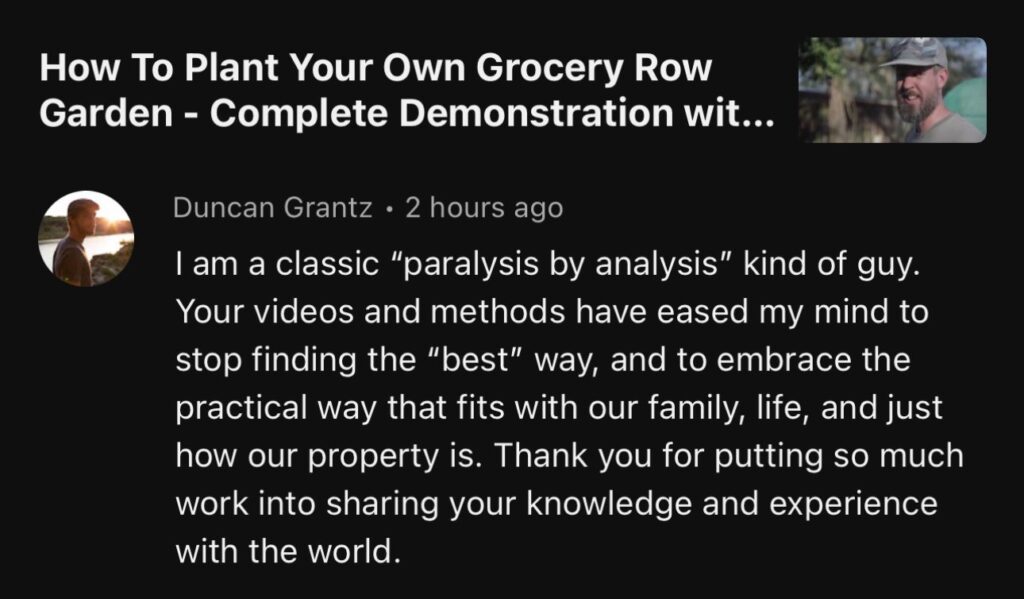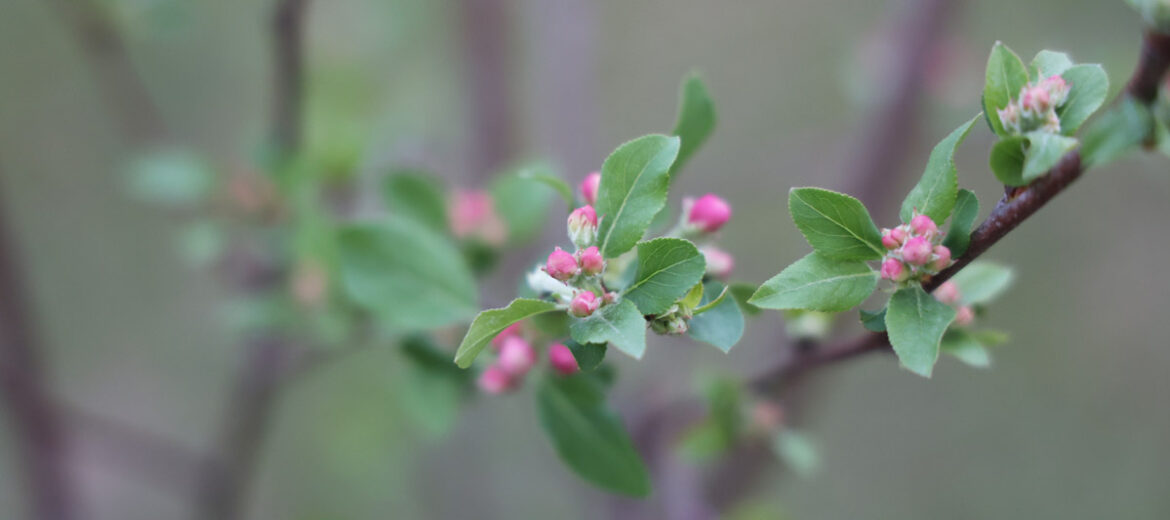The point of vegetable gardening is usually to grow food.
One person may have his little “therapy garden” and another might have a few tomato plants just for fun, but usually people grow vegetable gardens in order to provide food for the table.
If you’re getting advice that is making it harder for you to grow food and making you question the success you’ve had, maybe it’s not great advice.
ramtharthegreat writes:
“There’s a gardening channel on here based in New Orleans, and she feels she knows enough about gardening to do paid evaluation/recommendations regarding viewers gardens. I should note, she does have very good information for her area. However, she was recommending that everyone, regardless of zone, just leave some potatoes when you harvest and you will never need to plant any. Several people pointed out that can work where the ground doesn’t freeze, but you’ll need a different approach in the north. Turns out, she had not only never gardened where the ground froze 3 ft deep for months at a time every year, but didn’t understand that places like that could be gardened at all. Point is, no plan works everywhere, and watch out for the ‘experts’.”

Yep.
This is why I don’t write a regional book called Idaho Survival Gardening, or perhaps a broader tome, such as The Good Guide to Cold Climate Gardening.
It’s because…
I also like to cut through unnecessarily complicated systems and dispose of what isn’t helpful.
In yesterday’s video, I share my problems with a “Swiss Army Knife” plant that does poorly in our area.
Comfrey is barely a butter knife here in hot and humid USDA zone 8b.
Forget it. I’ve got better plants to grow!
Yet I do indeed get some crazy people that refuse to understand my methods:

I hate it when people misuse apostrophes.
Jack commented before, leaving a string of insults. I responded graciously then, but now I’ve banned him.
When a person is willfully as obtuse as that, it’s not worth engaging. His vitriol seems mostly directed towards my refusing to recommend no-till gardening in all situations.
Look – if you don’t have enough mulch but you want to grow food don’t worry about it! Just plant an unmulched row garden and keep it weeded with a hoe. People have done it forever. Whether or not you think it’s ideal isn’t important. My ideal garden would probably be a food forest, with some permanent compost-rich deep mulched beds closer to the house. Or my Grocery Row Gardens. But I’ll also use single-row gardens to grow food.
Grow that food, people! Don’t get hung up. And please learn to use apostrophes correctly.
As Duncan comments:
“I am a classic “paralysis by analysis” kind of guy. Your videos and methods have eased my mind to stop finding the “best” way, and to embrace the practical way that fits with our family, life, and just how our property is. Thank you for putting so much work into sharing your knowledge and experience with the world.”

Thank you, Duncan.
I’m trying to use my mind and heart to help others and take care of my own family, despite not being an expert on everything.
I’m also addicted to growing food, so if something gets in the way of that I usually discard it. Grow what grows in your climate. Learn what works for you. Be joyful!
And remember:


29 comments
Poor, Jack ! The know it all, never wrongs, like him, usually know nothing, and are almost always wrong. And THAT makes them mad!
Learn what works for you & be joyful!
Amen David, amen!
I agree with the comfrey is terrible and this article. Use the data that someone else has amassed. Take what works and do your own observations. I know our area is poor on certain minerals. All the microbe farming and enzyme sprays will not make those elements and molecules appear. So i take all i can get from JADAM. Enzymes and building up local micro critters. I take from Steve Solomon and supplement minerals. I take from David. All i got from David was some fetid swamp water. The best organic free miracle grow. I take encouragement from Russia their Dascha gardens grow 80% of the country’s vegetables. I watched David take chicken bedding and top dress grocery row beds. I read up about JADAM and watched their YouTube videos. They use a chicken manure/wood shavings mix with enzimes and have organic fertilizer. We have chickens and a local sawmill. We talke trash to the dump, hit the mill for old shavings and the end cuts go in our wood stove. Use your resources! YouTube is a resource. I have a vineyard (7 plants) 8 cherry trees, and a grafting hobby with apples and pears and plums. I use David like a borrowed mule. So keep it up. Because i pay almost nothing for my garden now. Almost Nothing. David if your back hurts. It’s probably because you are carrying me.
Thank you.
I can’t help but think of all the people I’ve learned from over the years. And how much more there still is to learn.
I try not to think about how much more learning I have to do. Some days I feel like I’m studying for my homesteading doctorate.
The more you know, the more you know you don’t know. Old dogs can learn new tricks. Planting not perfect fits me much better. I’m thankful to be outside the box thinking out here. Thank you DTG!
That was still being pretty nice to Jack! I’d have left him with this… https://m.youtube.com/watch?v=uSiHqxgE2d0&pp=ygURaGl0IHRoZSByb2FkIGphY2s%3D
HAHAHA
I resemble that analysis paralysis quote, and take great comfort from the gardening anarchy methodology. Instead of worrying about stuff being perfect, I have just been planting stuff everywhere as fast as I can. Instead of worrying about whether or not I have the perfect plant spacing or have the perfect spot for a particular crop picked out, I have started thinking about things as experiments. If something doesn’t work out, I can plant something different. I can use failed experiments as chop and drops. A chainsaw and a shovel will fix all these mistakes. I will learn from the mistakes and do something different next time. If I tried to make everything perfect, nothing would ever get planted. Using the gardening anarchy mindset, lots of stuff has been planted, and some of it will probably even produce food!
That’s right. Then you learn from what works or doesn’t quite rapidly. Experience and iterative design.
Thank you. I am trying to proceed slowly, watching the land (dry mud bricks at times!) And asking gardeners as I see them. Doing a little each day. But I want to plant a chicken garden. Watched several videos about good mixes, including Gabe Brown. I think I found a mix with some things recommended. So I don’t reinvent the wheel! Thanks for always showing us how to work best, where we are, God bless you.
I love the idea of a chicken garden.
I pictured planting eggs and growing new hens. HA!
I live about as far away from where you are as it is possible to go without wading in to the Pacific ocean, and some of what works for you well is not practicable here. You have to plant what will grow. Mom used to mourn about all the ways that peaches would die here, so instead I plant apples and plums, and where my raspberries are dying of root canker, I am putting in blackcaps and thimbleberries. I am looking to replace a cypress hedge with native serviceberries (amelanchier). They are adapted to the climate and even if they won’t put out luscious peaches, the leaves won’t turn black and fall off if I forget to spray.
This is not to say I don’t have a lot of fun trying to grow Taro, and have schemes to one day grow guavas, I just am not planning them to be anything more than a hobby
Yes, I am totally with you David. Some things I do because I enjoy the challenge, but the stuff I count on to feed us doesn’t get changed much. We’ve generally figured out what works in this climate.
“thimbleberries”
Do people sell thimbleberry starts or do you just have to acquire your own from the road cuts?
‘Cause it didn’t even occur to me that there might be a source for them other than taking them from the wild…
The local native plants society through the extension office has a sale each Spring and I suspect they are splitting up their own thimbleberries that they probably got from the woods. I bought my starts and the same year I got some Indian plum (Oemleria) to try to get early pollinators into the yard for the plums. My blackcaps are dug from the woods locally. I suspect they all can be bought from native plant nurseries too since they used to be grown commercially here, but I had run across a good stand in the woods it seemed like a waste to buy them.
The first years the thimbleberries didn’t do well, until I figured they needed more mulch and more water than the raspberries.
I have never been in a place with thimbleberries! They look beautiful.
oh, and to add: All Gardening Is Local
I like that
“I hate it when people misuse apostrophes.” You should have put an apostrophe in there, just for fun.
A+++
As tempted as I am, I won’t pile on Jack.
what if tilling fits someone’s circumstances such that that ie what gives them the best yield?
Or what if some likes to till? Some people like digging into the ground.
Even if it doesn’t give the same amount at harvest over another method, so what? Does it always have to be about maximization of production?
Yep. I agree. There is a time and place! I till when I need to.
I would absolutely buy a David the Good book on cool or cold climate gardening. Your mix of humor and solid information based on experience is unique.
Of course, you would need a co-author who had plenty of experience gardening in cool climates.
_The Good-Solomon Guide to Cool Climate Gardening_ — yes, that would have a lot of potential…
Hello david,
I have been looking for the update or called as Final experient result on your Apple in Florida.
4 to 5 years back you had purchased lots of high chill variety of apples and did an experient. I read somewhere that you sold the property but i need to hear (if you please) any updates regarding on that experient.
Did any of variety yield Fruit ? Which one was doing good in garden?
I’m hoping for some updates regarding on that in this comment.
They died after I left, as they were not really tended
I really do feel sorry for those people who have so little going on in their lives that the best use they can find for their time is insulting people they disagree with online.
When I lived in the north, we could get truckloads of woodchips almost on demand. I had inches of mulch in my garden and never had to till or dig, except to make holes to put potatoes in. Now I live in the south and I have yet to see a woodchipper truck clearing branches that I could flag down. Also I have way more land and a much bigger garden, and the grass chokes everything out if you don’t radically kill it all. At this point I don’t have the tools to gather enough organic material to use a deep mulch system. What I DO have is a friendly neighbor with a tractor who was happy to plow up an area for us. So I’ve had to radically change my approach to gardening in this area. No till is great if you can manage it, but if I had to go buy truckloads of organic material in order to do a no-till system, I’d go broke and be forced to give up gardening.
Science is great for showing us what is possible in a controlled setting. But it also has to be applicable to the real world, where there are externalities and resource limitations. In theory, infinite exponential growth yields a healthy economy and allows for fractional reserve banking and perpetual creation of wealth. But in reality, a finite planet limits inputs and resources, and unsustainable systems eventually collapse, regardless of what your graph suggests is theoretically possible.
Comments are closed.